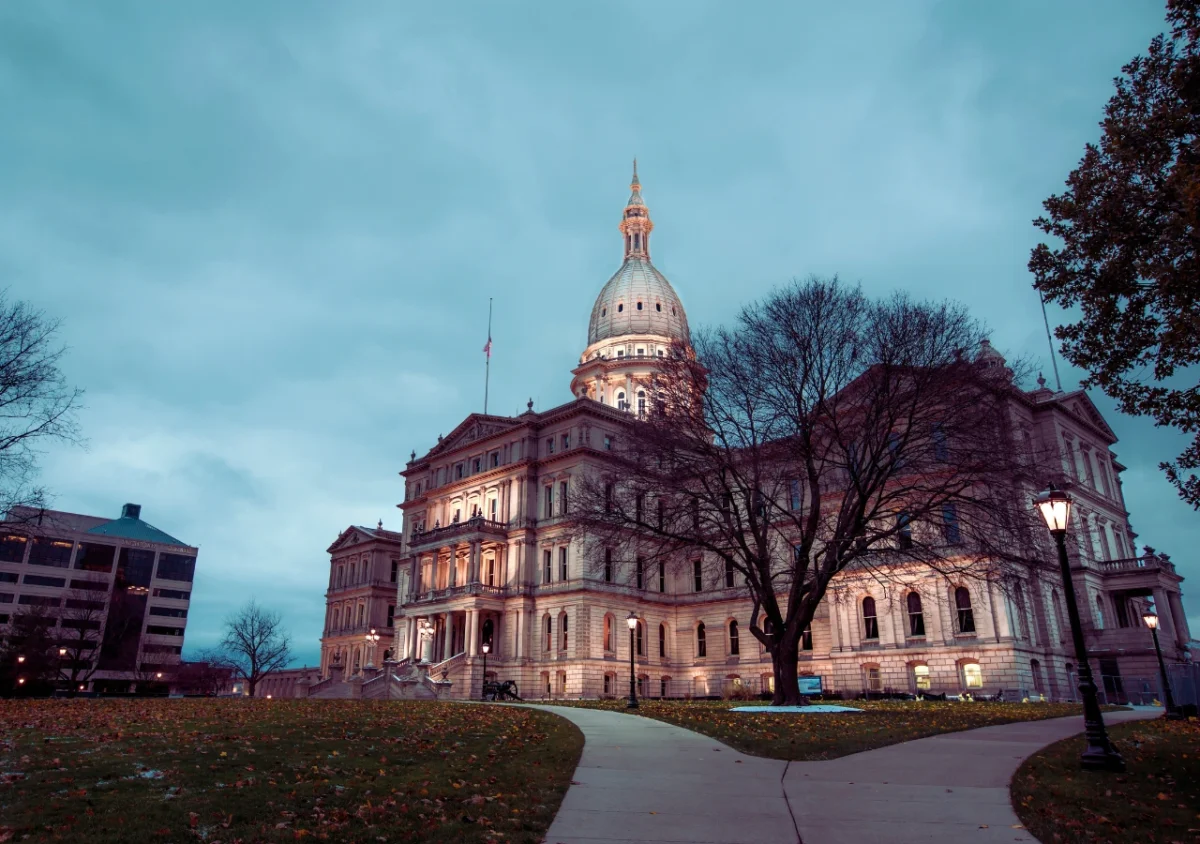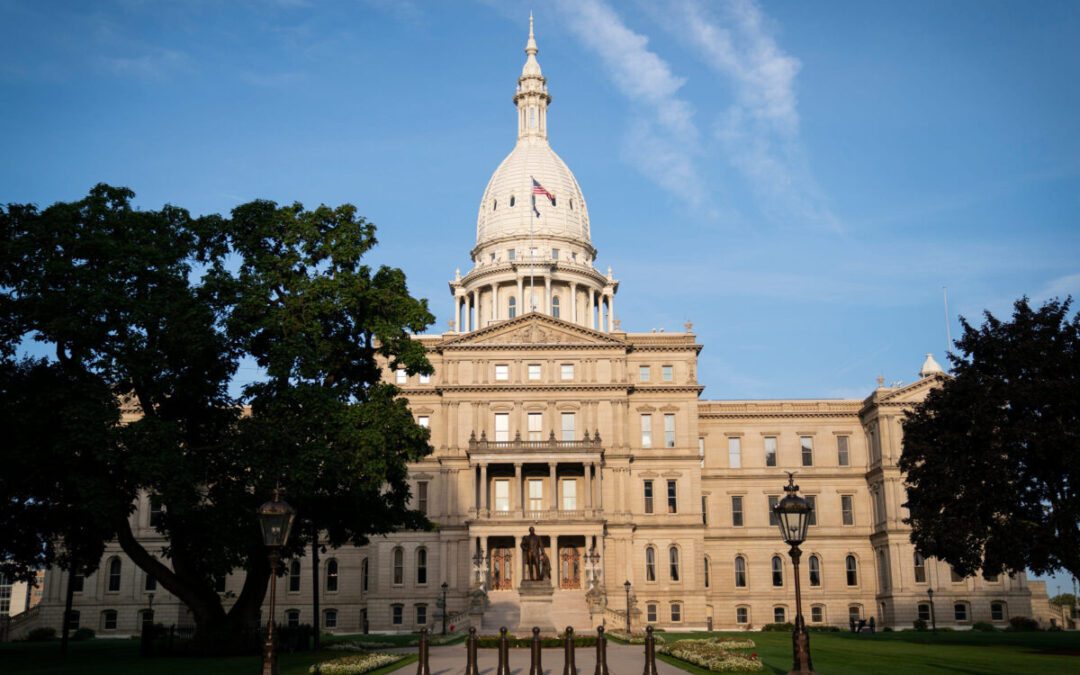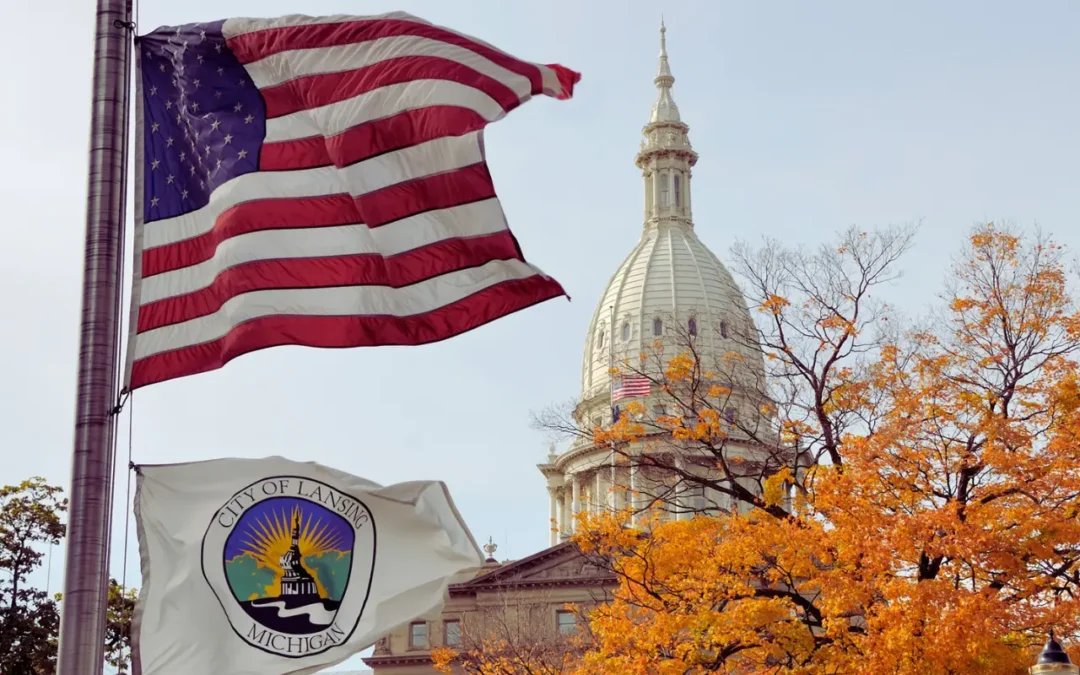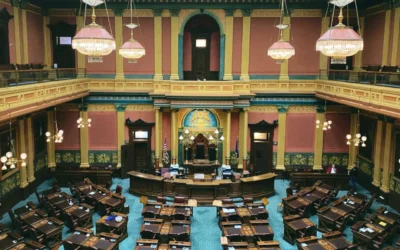
BY BEN SOLIS AND KYLE DAVIDSON, MICHIGAN ADVANCE
LANSING—In the thick of a government shutdown that lasted just one hour, the Michigan House and Senate passed a continuation budget to hold the state over for the next eight days—a move that was described as giving legislative staffers some cushion to finish drafting the final budget deal hammered out into the small hours of Wednesday morning.
The continuation budget, which was quickly signed by Gov. Gretchen Whitmer, is a modified version of the House’s government shutdown avoidance plan passed in March, offering to fund the state at just a fraction of the previous fiscal year’s spending. The hold over budget would fund the government over the next week at $1.56 billion with $272.3 million from the General Fund.
In many ways, the plan was designed by the Republican-controlled House for the very situation that the Legislature faced this week and for the few months that preceded it: A divided government unable to see eye-to-eye on key priorities; a House that took forever to pass its own budget; and a Senate that couldn’t get its road funding plan in order until just before the end of the fiscal year.
Although House Speaker Matt Hall (R-Richland Township) and his caucus said in March that the plan was simply a “break glass in case of emergency” tool, the Democrats in the House predicted that the plan signaled Republicans’ zeal to see the government shut down in some fashion.
But as the situation worsened over time, plenty of blame was to be shared among Republicans and Democrats when, on Tuesday afternoon, the respective chambers were still negotiating and working out the loose framework they agreed to last week.
An announcement from Whitmer, Hall and Senate Majority Leader Winnie Brinks (D-Grand Rapids) later on Tuesday evening said a final budget had been agreed to and all that was needed was to draft the bills and put them up for a legal review.
That takes some time, and it was impossible to expect that to be completed by the end of the fiscal year at midnight on Tuesday.
Whitmer also made the rather bizarre proclamation that the government would not shut down, but offered no real details on how she would keep it open. There was much speculation around whether the governor would issue an executive directive to keep spending, but at what levels of the now-lapsed fiscal year was unclear.
Many surmised that the move would be unconstitutional seeing as how a provision in the state Constitution dictates that no government spending could commence without an appropriations bill in place for the next—or in this case, the new current—fiscal year.
Eventually, the fiscal year ended, and on Wednesday at 12:01 a.m., both chambers adjourned, resumed session and went back into caucus meetings as the government was, constitutionally speaking, shut down.
Soon afterward, it became apparent that there was no longer a need for any Whitmer executive spending action.
The Senate announced that it would discharge House Bill 4161, which was now properly labeled as a stopgap to avoid a prolonged government shut down, from the Senate Appropriations Committee.
Reconvening at 12:30 a.m., the upper chamber quickly entered recess before returning just before 1:30 a.m. to take up a substitute for the stopgap bill providing funding until Oct. 8.
After adopting the substitute, the Senate approved the measure 31-2.
Sens. Jim Runestad (R-White Lake) and Jonathan Lindsey (R-Coldwater) voted against the bill, while Sens. John Damoose (R-Harbor Springs) and Michelle Hoitenga (R-Manton) did not vote at all. The chamber granted the bill immediate effect.
Following the vote, Brinks told reporters the measure would last for a week to give the Legislature time to finish writing the final budget bill.
“We do have a budget agreement,” Brinks said. “We’ll get the bill written, and we will vote it out as soon as possible, after it’s ready.”
While Brinks said there was a strong framework in place last Thursday, there were a number of details that needed to come into place, and the bill simply wasn’t ready for a vote leading into the deadline.
“I certainly wish that we weren’t here at this moment tonight, but I think the important thing to remember is that we were able to come to an agreement, even in a time like this, with divided government,” Brinks said. “We will be keeping government services open. The people in Michigan can still get what they need from their government for the next week, despite this minor delay.”
The bill then moved to the House.
After taking leave to caucus, Democrats and Republicans reentered the House chamber and passed the bill on a 103-4 vote. The only no votes came from Republican Reps. Steve Carra of Three Rivers, Jim DeSana of Carleton, Tom Kunse of Clare and Jaime Greene of Richmond.
Democratic Reps. Peter Herzberg of Westland, Regina Weiss of Oak Park, and Karen Whitsett of Detroit did not cast votes for the bill.
Democratic Minority Leader Rep. Ranjeev Puri (D-Canton) said that it went without saying that the whole budget process this year was “highly unusual.”
“The House Democrats were excited to be able to play a role here to make sure that we’re getting this state one step closer to making sure our departments and our employees have some certainty in the process,” Puri said. “House Democrats are committed to showing up day in and day out, no matter how long this process is drawn out, and to making sure that we’re advocating for the values that our state needs.”
State Rep. Alabas Farhat (D-Dearborn), a member of the House Appropriations Committee, said that those watching closely clearly saw that votes from House Democrats were needed to get the stopgap spending bill across the finish line and avoid a full government shutdown while the work continues.
“That’s been constant since last week heading into negotiations. Our votes and our caucus participation has been, I think, crucial to making sure we’re avoiding a full blown shutdown,” Farhat said. “And if you see what’s happening in D.C. right now, where they’re not even able to work together, I think in Michigan, we’re showing a new path forward and showing a way that we can come together on bipartisan common sense wins – whether that’s quality public schools, that’s long term road funding, and that’s making sure we’re funding our public safety.”
Republican Majority Floor Leader Rep. Bryan Posthumus (R-Rockford) said the base budget is done and agreed upon, and that they’re now in the processing phase. He expected the chamber to vote on the conference committee budget on Thursday.
READ MORE: Michigan budget crisis averted: Legislature, Whitmer announce deal days before shutdown
This coverage was republished from Michigan Advance pursuant to a Creative Commons license.

Michigan Senate passes petition collection, election disinformation reforms
BY BEN SOLIS, MICHIGAN ADVANCE MICHIGAN—The fight against election disinformation and changes to Michigan’s petition circulation process cleared the...

Michigan OKs landmark regulations that push up-front costs to data centers
Michigan regulators on Thursday adopted landmark standards for the booming data center industry with a plan they say tries to protect residents from...

Q&A: Why this 29-year-old Detroiter thinks he can make Michigan government work again
Democratic state Senate candidate Justin Onwenu says he wants to rebuild trust, invest in neighborhoods, and help deliver a new generation of...

Michigan state budget 2026: 7 things to know about the bills
LANSING — Lawmakers on Oct. 2 and Oct. 3 voted to approve a 2026 budget plan that makes cuts to many state agencies while boosting funding...

Michigan budget crisis averted: Legislature, Whitmer announce deal days before shutdown
BY BEN SOLIS, MICHIGAN ADVANCE LANSING—The respective leaders of the Michigan Legislature and Gov. Gretchen Whitmer on Thursday evening announced...




